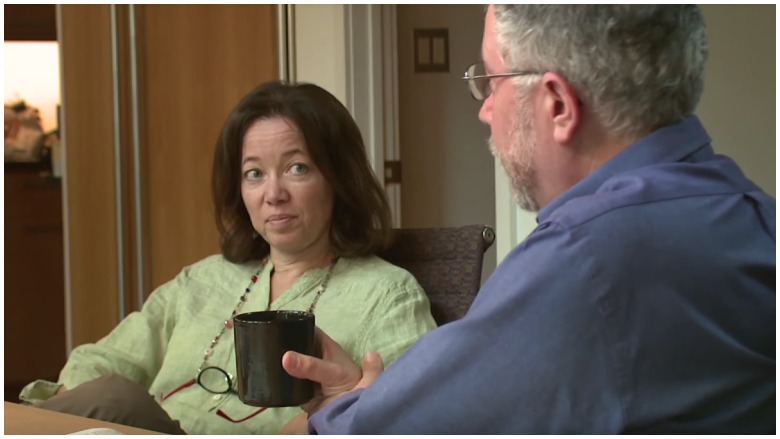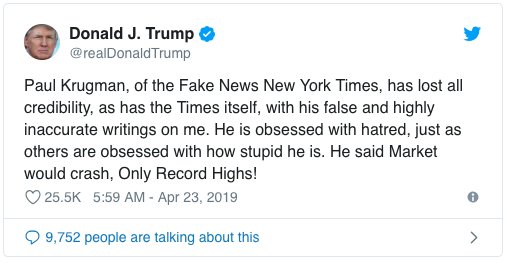
YouTube Robin Wells and Paul Krugman.
Robin Wells, an economist and author, is married to Nobel Prize-winning economist and New York Times opinion columnist Paul Krugman.
Krugman drew the ire of President Trump for an op-ed published on April 22 called “The Great Republican Abdication.” In reaction to Special Counsel Robert Mueller’s redacted report, Krugman wrote, “Never mind attempts to spin this story as somehow not meeting some definitions of collusion or obstruction of justice. The fact is that the occupant of the White House betrayed his country.” He criticized the Republican party as having given up on American values, and that “the modern G.O.P. is perfectly willing to sell out America if that’s what it takes to get tax cuts for the wealthy. Republicans may not think of it in those terms, but that’s what their behavior amounts to.”
President Trump slammed Krugman on Twitter, writing that Krugman had “lost all credibility.” Trump added that he felt the New York Times should “get down on their knees & beg for forgiveness.”
Krugman responded by pointing out, “Someone is listening!” and posting a screengrab of the president’s tweet.
Krugman has been in the spotlight often over the years, and his wife Robin Wells appears to have been a driving force in putting him there. She has admitted in past interviews that she has encouraged Krugman to use more aggressive language in his writings, especially when discussing politics.
Here’s what you need to know about Robin Wells.
1. Robin Wells Has Taught Economics at Princeton, Stanford & MIT
Paul Krugman may get more of the attention, but his wife’s resume is just as impressive. Robin Wells earned her bachelor’s degree from the University of Chicago. She then focused on international finance and debt crisis for her Ph.D., which she earned from the University of California at Berkeley. Wells’ then completed a postdoctoral fellowship at MIT. She met her future husband, Paul Krugman, during her MIT fellowship; he was teaching at MIT at the time.
Wells has also taught at multiple universities over the course of her economics career. She has been a professor at the Stanford Business School, the MIT Department of Economics, and the Princeton University Department of Economics.
According to her bio on Macmillan Learning, Wells also taught at the University of Michigan and the University of Southhampton in the United Kingdom.
In an interview with PBS, Wells talked a little bit about her family. She grew up in Dallas and that her family lineage included African-American, Native American, Scottish, English, and Irish bloodlines.
2. Robin Wells Says She Has a More Political Mind Than Her Husband & Encouraged Him to Write More Aggressively About Politics
Robin Wells told PBS during a 2012 interview that she had a “more political mind” than her husband. When asked if she provided the “political oomph behind her husband’s economics,” Wells agreed that was true. But she added that Krugman has needed less encouragement on that front as he became more comfortable mixing economics and politics.
This motivation was explained in an in-depth New Yorker magaine profile on the couple in 2010. Wells explained that she often edited Krugman’s articles and focused on making them “less dry.”
The reporter included an example of an article Krugman was writing for Rolling Stone at the time. The topic was the financial crisis and how President Obama was trying to navigate it. He had written, “As Obama tries to deal with the crisis, he will get no help from Republican leaders.” Wells then added the sentence, “Worse yet, he’ll get obstruction and lies.”
3. Robin Wells Was an Early Supporter of Universal Health Coverage; She & Paul Krugman Initially Viewed Barack Obama’s Ideas on Health Care as Too Conservative
Robin Wells is likely enjoying the current political conversation happening among Democrats about the future of health care. Democratic candidates for president have been debating a single-payer system and a public option that would enable any American to enroll in Medicare. Wells appears to have been years ahead of this debate.
In the 2010 New Yorker profile mentioned above, the reporter wrote that Wells and Krugman, during the 2008 election, viewed Barack Obama’s ideas on health care as too conservative. Wells apparently pushed Krugman, in his political writings, to “be more stubborn in holding out for the public option in the health-care bill.”
Wells and Krugman co-authored an article called “The Health Care Crisis and What to Do About It” for the New York Review of Books in 2006. They detailed how private insurance works in the United States, argued as to why the system is too expensive for patients and laid out arguments as to why they felt the government needed to have a larger role in ensuring that everyone had access to quality health care. Wells and Krugman wrote that they felt a single-payer system was the right way to go, despite the political problems it would face. They ended the essay with this conclusion:
“So what will really happen to American health care? Many people in this field believe that in the end America will end up with national health insurance, and perhaps with a lot of direct government provision of health care, simply because nothing else works. But things may have to get much worse before reality can break through the combination of powerful interest groups and free-market ideology.”
4. Robin Wells Appeared to Predict the Current Debate on Trade & Argued That Decisions Made in the 1980s Eventually Contributed to the Great Recession
Robin Wells and Paul Krugman wrote extensively about the recession and how the U.S. economy was going to climb out of it. They spoke at a symposium in 2009 about the economic crisis; excerpts were later published in the New York Review of Books.
Wells argued that the problem began to manifest in the 1980s during the Reagan administration. She stated that the United States “experienced chronic fiscal deficits, and we began to abdicate our responsibility to raise tax revenue that could sustainably finance government.” She said the U.S. became accustomed to operating on a deficit and relying on other countries for capital, and that the practice allowed Americans to “live beyond our means. Wells wrote:
“The persistent imbalances led us to pretend that we could keep borrowing without having sufficient tax revenue to pay for the government. And if your house prices are rising, if the stock market is going up—which of course is going to happen if you have cheap money—it puffs up the value of the assets, and disguises a lot of other structural problems such as rising inequality and corruption.
Wells also appeared to foreshadow the current sparring with China on trade. She predicted that the U.S. might shift toward “more protectionism” in order to address long-standing trade imbalances with some of our closest allies. Wells stated that “no one was willing” to say out loud that the economic relationship with China needed to change. You can read her full statement here. You can also listen to her full analysis in the video embedded above. Wells begins speaking at about the 40-minute mark.
5. Robin Wells Teaches Yoga
Robin Wells takes her teaching talents beyond the typical classroom. She also likes to practice and teach yoga.
She explained in the 2010 New Yorker profile that she taught classes at their home in Princeton, New Jersey. Krugman would often participate, though he said he preferred to avoid the classes when younger people were there.
To relax, the couple likes to take vacations to St. Croix. They reportedly own a condo on the beach there, which they bought in the early 2000s.
READ NEXT: Meet the Woman Who Helped Us See the First-Ever Photo of a Black Hole
